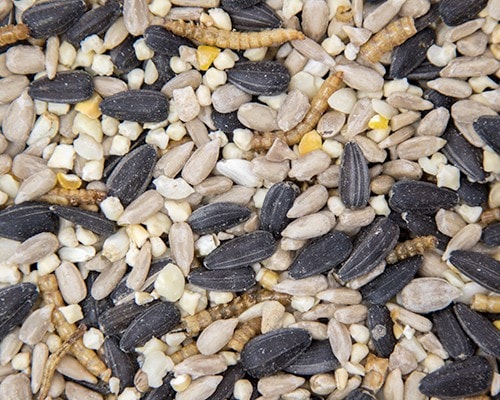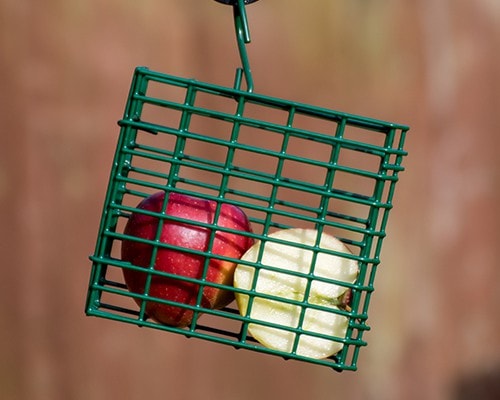What to Feed Garden Birds
Feeding garden birds is becoming increasingly popular, with around half of UK gardens offering food to wild birds. It is easy to pick up wild bird food anywhere at low cost, but although cheaper foods seem economical it can be false economy as cheaper foods are likely to contain a high percentage of wheat and inappropriate ingredients, such as broken up dog biscuits.
Seed mixes
 Seed mixes are a convenient way of buying wild bird foods, usually containing a range of seeds to appeal to a variety of garden birds. But beware which seed mix you buy as most contain wheat. Wheat and other cheap fillers, such as split peas, are mostly indigestible and of low nutrient value to the majority of small garden birds. Pigeons will readily eat wheat so you are likely to see lots of pigeons hanging around in your garden if you feed a mix containing wheat. Pigeons will also scare away the smaller birds, so if you want to attract the smaller garden birds avoid mixes containing wheat.
Seed mixes are a convenient way of buying wild bird foods, usually containing a range of seeds to appeal to a variety of garden birds. But beware which seed mix you buy as most contain wheat. Wheat and other cheap fillers, such as split peas, are mostly indigestible and of low nutrient value to the majority of small garden birds. Pigeons will readily eat wheat so you are likely to see lots of pigeons hanging around in your garden if you feed a mix containing wheat. Pigeons will also scare away the smaller birds, so if you want to attract the smaller garden birds avoid mixes containing wheat.
To help support wild birds as best you can only provide a high quality mix containing only nutritious ingredients. Good mixes are based on sunflower seeds, and are likely to contain peanut granules which are high in energy and essential oils.
Our seed mixes are tailored to different feeding methods and the seasons of the year to help provide birds with what they need throughout the year. Our ground and table mixes are based on sunflower hearts and rolled oats to cater to the needs of soft billed birds, whereas our hanging seed feeder mixes contain black sunflower seeds and hemp seeds which are readily eaten by birds that are able to feed from a hanging feeder.
Straights
Straight seeds can be fed alone in a hanging feeder or placed on a bird table or on the ground. Sunflower hearts are a popular straight seed as it is favoured by more species of birds than any other seed. As well as being no mess, sunflower hearts are a versatile seed that can be fed on its own or as part of a mix. Soft billed birds such as the Robin cannot break open the husk of black sunflower seeds so sunflower hearts are a great way to provide soft billed birds with the nutrients of sunflower seeds.
Black sunflower seeds are higher in oil and have a thinner easier to open husk than striped sunflower seeds. Black sunflower seeds are a classic seed that is loved by many species of birds. Birds such as the Nuthatch will take black sunflower seeds from a feeder and eat them somewhere they feel safe.
Niger seeds are an oil rich seed that is loved by finches and siskins, in particular Gold Finches. Niger seeds are a tiny seed that is best fed from a specialist hanging Niger feeder that has tiny port holes to prevent spills. Containing high levels of amino acids these seeds are particularly beneficial for young fledglings.
Peanuts
Peanuts are available as whole peanuts or kibbled peanuts. Peanuts are highly nutritious and loved by many birds, particularly Finches, Tits, Woodpeckers and Nuthatch. Containing up to 50% oil and rich in essential fibre peanuts are a great food source to provide in your garden. It is essential that peanuts are aflatoxin tested to keep birds safe from the natural toxin found in peanuts.
It is important that whole peanuts are fed from a mesh feeder, particularly in spring to ensure adult birds do not take large nuts back to their nests for their young, as whole nuts are a choking hazard to young birds.
Kibbled peanuts are a versatile food source for all wild birds, due to the small size of kibbled peanuts they are suitable for feeding young birds. Kibbled Peanuts are great when added to mixes as well as fed from a bird table or ground table for birds that wouldn’t normally have access to whole peanuts in a hanging feeder.
Suet
Suet products are an important addition to all gardens to help wild birds survive the challenges they face throughout the year. Suet is high in energy which helps to keep wild birds warm through the colder winter months, and gives them the extra boost they need to remain healthy through the breeding season and annual moult.
Be careful which suet balls you provide your garden birds as some of the cheap suet balls available on the market may contain very little fat, and may include sawdust or chalk as fillers to keep production costs down. Only provide suet balls that are made using suet and seeds, as this is what wild birds are interested in. Our super suet balls do not melt during the warmer summer months so will not smear onto the feathers of wild birds. It is important to use suet balls that are not in nets, as the nets can trap and injure wild birds. Suet balls and suet blocks can be placed on the ground, on a table or put into a suitable hanging suet feeder.
Suet pellets are a great energy source for a wide variety of wild birds. They are ideal for adding to mixes to provide an extra energy boost, fed from the ground or bird table, or fed from a suet pellet feeder. Whichever method you choose to feed suet pellets they are sure to be quickly eaten!
Suet filled coconuts are very easy to use, just hang them up anywhere in your garden and watch the birds come to enjoy them. Lots of species of birds love suet including Tits, and Nuthatch. A tip to soften suet balls prior to feeding in harsh cold weather is to put them in the microwave for a few seconds.
Mealworms
Mealworms are a great source of protein for wild birds and can be fed live or dried, dried mealworms are a much cheaper, cleaner and more convenient alternative to live. Dried mealworms can be rehydrated prior to feeding to provide extra moisture for garden birds, soaking dried mealworms also makes them easier for young birds to swallow.
Mealworms are a firm favourite of Robins, and other insect eating birds will also gladly accept mealworms, particularly when natural sources of insects are low during winter. Dried mealworms are a versatile all year round food source for wild birds and can be fed from the ground or a bird table, or added to mixes for an extra protein boost. The feathers of birds are made up of up to 85% protein, so extra protein in the diet is particularly important during the spring and summer months to help birds through the breeding season and annual moult.
Fruit
 Putting fruit out in your garden will be greatly appreciated by a variety of birds, particularly through the winter when natural fruit sources are low. Fruits such as apples, pears, plums, grapes, sultanas, raisins, berries, and occasionally bananas to name a few, are all suitable to provide in your garden on a bird table, on the ground or in a suet block feeder. Grapes and dried fruits, such as sultanas, are loved by Blackbirds and Thrushes. Apples and pears can be bruised or part rotten, and if you chop them into chunks Tits will also be able to enjoy the fleshy fruit.
Putting fruit out in your garden will be greatly appreciated by a variety of birds, particularly through the winter when natural fruit sources are low. Fruits such as apples, pears, plums, grapes, sultanas, raisins, berries, and occasionally bananas to name a few, are all suitable to provide in your garden on a bird table, on the ground or in a suet block feeder. Grapes and dried fruits, such as sultanas, are loved by Blackbirds and Thrushes. Apples and pears can be bruised or part rotten, and if you chop them into chunks Tits will also be able to enjoy the fleshy fruit.
Fruit such as sultanas and grapes are poisonous to dogs and cats, causing kidney failure, so must not be fed in a garden where they may be eaten by pets. For this reason, our ground and table mixes have a pet safe alternative which do not contain sultanas.
Naturally energy rich and full of simple sugars, fruit is an important part of the diet of a wild bird. Dried fruits should be soaked during spring and summer to make them easier for young birds and fledglings to eat and digest.
Kitchen scraps
Kitchen scraps should be fed carefully alongside good quality seeds, suitable foods include unsalted fats and meats, small amounts of occasional bread, mild grated cheese, cooked potatoes, and pastry made with real fats. Food scraps can be fed on the ground, on a bird table, or hung in a suet block feeder.
AVOID polyunsaturated fats as they do not provide high enough energy levels that are essential for wild birds to survive, especially through cold winters. Tits, Great Spotted Woodpecker, Thrushes and Wrens are among the many species that love fats and suet. Fat from unsalted meats will be thoroughly enjoyed by your garden birds.
Bread acts as an empty filler so is best fed sparingly as part of a varied diet, it does not contain the necessary protein and fat wild birds require in their diets. Although bread is not harmful to wild birds if eaten long term it may result in serious vitamin deficiencies.
Mild grated cheese is a favourite of Robins, Dunnocks, Blackbirds, Thrushes, and Wrens. Cooked or uncooked pastry is great for wild birds, especially if it is made with real fats.
Potatoes should be cooked before offering them to your garden birds. Roasted, mashed and baked potatoes will all be eaten from the bird table or ground. Baked potatoes should be opened up to allow the birds to get inside to the fluffy part of the potato. Potatoes are great if they have been cooked in real fat. Most birds will refuse chips.
Salt is toxic to birds as they are unable to metabolise it and it can affect their nervous system. Never put out salted foods and never add salt to bird baths if you are trying to prevent them from freezing.